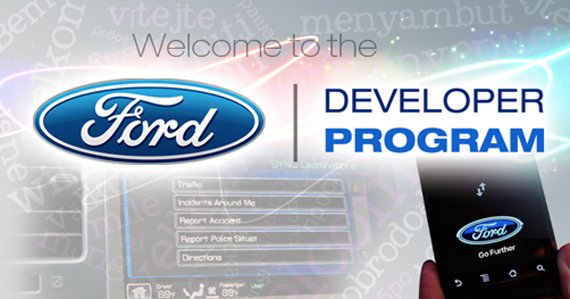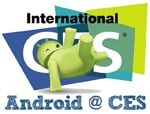Ford announces OpenXC SDK; Android apps can now easily access sensor data

Inside any new car are a plethora of sensors and microprocessors, crunching away at data to control the various systems in the vehicle. Announced today at CES 2103, Ford's new OpenXC platform will allow Android developers to have an easy way to gather that data and put it to work.

Billed as a combination of Arduino and Android, OpenXC uses tools people already know to help design after-market accessories and software. Right now there are parts and an SDK component that allow developers to plug into the OBD-II port and send signals via USB or Bluetooth that any Android device running software with the OpenXC library can read and understand. This is all done over a CAN bus to stay isolated from the vehicle electronics, so your $20,000 car won't be damaged,
There has always been expensive and OEM solutions for folks who want to access vehicle data, but with today's news Ford is making it accessible to folks without a giant bucket of money to spend. It will be interesting to see what folks can come up with using Ford's new tools. See the full press release after the break, and hit the link below for more information.
More: OpenXC
Ford OpenXC Platform Is Now Open for Vehicle Data, Customizable Hardware and Open-Source Research
- Open-source hardware and software toolkits are now available at http://openxcplatform.com for developers and researchers who want to explore what can be done with vehicle data
- Ford is encouraging developers, researchers and hackers to focus on using big data and open-source innovations using OpenXC
- The launch of OpenXC marks the second developer platform to be offered by Ford
LAS VEGAS, Jan. 10, 2013 – On the heels of launching its first software developer program, Ford is now turning its attention to the growing trend in hardware hacking by transforming vehicles into an experimental development environment. The OpenXC research platform from Ford is now out of beta and available to all “makers” and do-it-yourselfers at http://openxcplatform.com.
Earlier this week at the 2013 International CES the Ford Developer Program was launched making the SYNC® AppLink™ application programming interface (API) available for the creation of smartphone apps that can be controlled inside the car using your voice.
Be an expert in 5 minutes
Get the latest news from Android Central, your trusted companion in the world of Android
While AppLink is available in Ford vehicles now, OpenXC is focused on the future as an open-source hardware and software platform developed by Ford Research and Innovation to unleash the power of the open-source hacker community to explore what can be done with vehicle data.
“Ford is committed to innovating with the help of software and now hardware developers,” said Paul Mascarenas, Ford vice president and chief technical officer. “By connecting cars and trucks to wireless networks, and giving unheard-of access to vehicle data, entirely new application categories and hardware modules can be explored – safety, energy efficiency, sharing, health; the list goes on. OpenXC gives developers and researchers the tools they need to get involved.”
The OpenXC kit includes a vehicle interface module based on the popular Arduino platform developers can use to read data from the vehicle’s internal communications network. The hardware module provides real-time access to parameters like the vehicle sensors, GPS receiver and vehicle speed. The hardware module is connected to a smartphone or tablet on which apps can be written to consume and use these data.
The read-only system is designed to keep everything isolated from the vehicle control systems. The OpenXC website also provides schematics, documentation and code for open-source hardware modules, including the wireless solar-powered heads-up display developed by OpenXC co-founder Bug Labs.
“Through the OpenXC platform, we are paving the way for new opportunities that will help us prepare for the future of transportation where the automobile, mobile networks and the Internet cloud come together in ways never before imagined,” said Venkatesh Prasad, senior technical leader of Open Innovation for Ford Research and Innovation.
“OpenXC is an extension of the work being done at the Ford Silicon Valley Lab focusing on big data, open-source innovation and user experience,” added Mascarenas. “We are enabling independent developers to flesh out their ideas using affordable and accessible hardware and software tools.”
Some of the areas developers can target with OpenXC include:
- Big data – Ford is increasingly a data-driven company fusing both internal and external sources to guide product and marketing offerings and support strategic decision making. In addition, vehicle data from the growing list of sensing technologies built into the car can be used locally to provide for the creation of a more personalized, convenient and productive driving experience, and aggregated to help address congestion and improve efficiency
- Open-source innovation – Viewing the car as a platform and providing access to real-time data allows for the rapid development of custom hardware and software applications. Ford has extensive experience in development of on-board and off-board applications for production cars using the SYNC in-car connectivity system, and now the Silicon Valley Lab is looking at open-source research using the OpenXC platform
- User experience – Connectivity is an increasingly important part of the total user experience while driving. Finding new ways to reduce stress and keep the driver informed can make driving a more pleasant experience
- Early in 2012 Ford shipped the first OpenXC beta toolkits to universities such as the University of Michigan, MIT, Stanford University and HCL Technologies in India. Since that time, OSIsoft has sponsored a hackathon to create an application using vehicle data from OpenXC in combination with its enterprise data analytics platform.
At Michigan State University, a team of undergraduate students has built an Android app that uses OpenXC to collect data from the Ford MyKey® system into a centralized database and present it in visual report card format.

Jerry is an amateur woodworker and struggling shade tree mechanic. There's nothing he can't take apart, but many things he can't reassemble. You'll find him writing and speaking his loud opinion on Android Central and occasionally on Threads.
